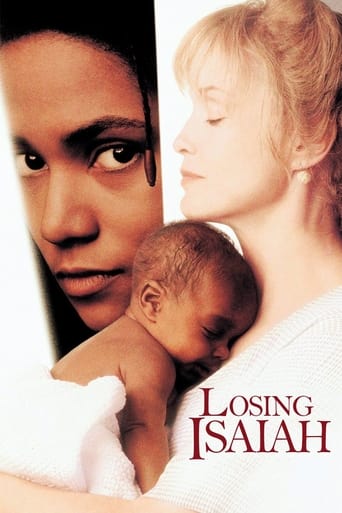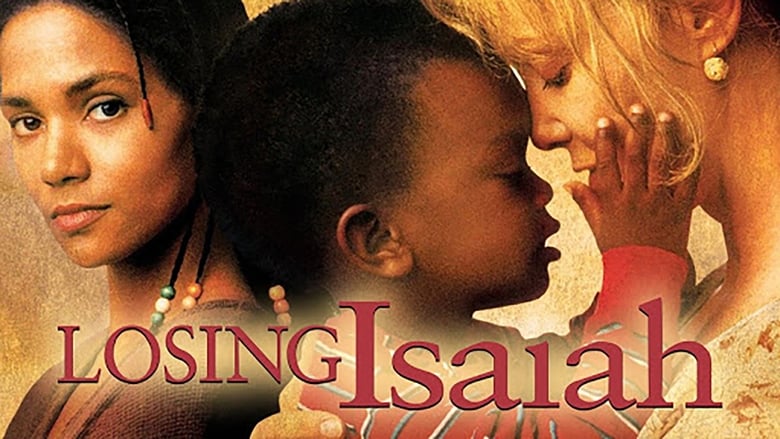Losing Isaiah (1995)
Khaila Richards, a crack-addicted single mother, accidentally leaves her baby in a dumpster while high and returns the next day in a panic to find he is missing. In reality, the baby has been adopted by a warm-hearted social worker, Margaret Lewin, and her husband, Charles. Years later, Khaila has gone through rehab and holds a steady job. After learning that her child is still alive, she challenges Margaret for the custody.
Watch Trailer
Cast
Similar titles



Reviews
the audience applauded
Sorry, this movie sucks
Instant Favorite.
Awesome Movie
I find it interesting that so many reviewers mistakingly describe the Lang character as the "foster parent"-she actually adopts him years before the birth mom returns for him. From a legal/social work perspective, this movie is in outer space. Which may be great for melodrama, but does a disservice to the thousand of children in this country who are available for adoption and languishing in foster care. The film is irresponsible, because it reinforces common misperceptions about adoption and encourages the deepest fears of those who might consider adopting. Every state has a statute of limitations for appealing termination of parental rights prior to adoption. Birth parents cannot return to the scene years after an adoption has been finalized to contest the validity of the termination of their parental rights. The race-based position of the bio mom's lawyer, whatever its merits from a moral perspective, would never make it into court. There is federal law against this. As other reviewers have noted, foster parenting is a different story and there is typically a strong push in favor of reunification with the biological parent before rights are terminated.
Should an African-American child be raised by Anglo-American parents? This is the perplexing question raised in Stephen Gyllengaal's tragic "Losing Isaiah", the story of the desperate custody battle between the white adoptive parents and the black biological mother of little four year old Isaiah. Khaila Richards has discovered that the baby she left in a cardboard box is still alive and lays claim to him, stating that he should not be raised by parents of a differing colour. Margaret and Charles Lewin will not concede without a fight though, and they enlist an African-American attorney to represent their cause.Director Gyllenhaal fails (incredibly) to generate compassion for any of the characters involved, not even Isaiah! Naomi Foner's screenplay (from Seth Margolis' novel) has unfortunately underdeveloped its pivotal players, and thus we are unable to associate with them and get under their skin. The characters of Khaila and Charles Lewin are particularly overlooked.Here we have a film that presents a shocking and challenging topic without (somehow) shocking or challenging us. Failing almost entirely to invoke the emotions, I was no more inspired than having read the story in the newspaper. Marc John Jefferies is cute, yet Gyllenhaal barely even plays on this, amazingly.Both Director and screenwriter have skimmed over the top of all the sensitive issues and shirked all the antagonistic problems that "Losing Isaiah" raises. They never stir deeply enough nor give the movie a harsh enough edge. The soft ending is a major disappointment too, when this picture desperately needed a hard-hitting finale to drive home a point, one Mr. Gyllenhaal's film never had to make in the first place.Racial issues throughout are intriguing yet sadly never fully examined. Should black and white mix when it comes to raising children? Can white folks raise an African-American child satisfactorily, so that he has a full understanding of who he is, his heritage, and so that he's sure of his position in society and is able to form and maintain stable relationships? Then again, is an ex-crack addict who threw her new born baby out with the trash fit to be a mother? The ultimate question is of course, what's best for Isaiah? With all this in mind, the whole movie just did not have the impact it required and will leave you untouched.All the acting is of a good standard, though never to the height it could have been. Both David Strathairn and Samuel L. Jackson ("Pulp Fiction") are hard pressed to do anything with their limited roles, Halle Berry shows she's on the rise with a convincing portrayal of Khaila, while Jessica Lange is strong but she's been infinitely better. In fact the most disappointing thing about Ms. Lange's showing was her appearance! She looked dreadful, as if she hadn't slept in days, and her hair was awful. Certainly a far cry from the gorgeous blonde in "Tootsie".It was great to hear another fine Mark Isham score.Tuesday, June 6, 1995 - Hoyts Forest Hill Chase
'Losing Isaiah' is a film that is very relevant in today's climate where care homes are over-flowing with children because of the lack of foster parents yet still social services still allow place race as a deciding factor in the fostering process.Based on the novel by Seth J. Margolis, the film sees baby Isaiah being abandoned by his drug addict black mother Khaila Richards in a bin shortly after his birth. He is found and taken to hospital where Margaret Lewin, a white doctor caring for him, decides to adopts him as her own child. Isaiah fits well into the Lewin family despite hailing from a different racial background and he grows into a happy, cherished little boy. But four years later, Khaila is back on the scene demanding custody of her son back now that she is clean. And it seems the Lewins' have a fight on their hands to keep the child since the family court system not only favours children being returned to their parents but also the idea of people only being allowed to foster/adopt children of the same racial background as themselves.The quality of acting was excellent from all members of the cast. Jessica Lange gave a great depiction as Margaret Lewin, the mother who doted on Isaiah with as much love as if she had given birth to him herself. Although, on the surface, it was quite hard to like Khaila Richards, Halle Berry gave the role substance and managed to make her an almost sympathetic character as the film went on. However, the real praise has to be reserved for the tiny Marc John Jefferies, who played Isaiah. Anyone who has ever said small children can't act or tried to excuse mediocre child acting on the basis of the child's age needs to see this boy's first-class performance despite the fact he must barely have been out of nappies when he appeared in this film.Reading other people's reviews, it's clear some people don't realise that social services will push to place a child back with their biological family even in a situation like this. No, I don't think it's right as there are many cases where the best place to ensure a child's well-being and happiness is to be far, far away from their parents but, sadly, that doesn't often happen. And race does still play a role in where a child up for fostering/adoption is placed. So, for me, I found this film quite realistic in that respect and could completely empathise with the Lewin family's sense of helpless and disbelief as they risked losing their son to a mother who dumped him purely on the basis of they had the wrong skin colour and DNA. 'Losing Isaiah' certainly shows that a child's sense of security and love must always come first, regardless of what the biological mother wants or whether his skin tone matches his adoptive parents.The ending, unfortunately, was rather a cop-out. It delivered a typical Hollywood 'happily ever after' with political correctness probably at the forefront of the scriptwriter's mind bu, in terms of reality, with both mothers' agreed to share custody with the child remaining at his adoptive parents' home but going to a nursery school of Khaila's choice with her accompanying him, viewers were left annoyed the issues raised in the film were not properly addressed. Perhaps a better resolution would have been to see Khaila forced to give up custody (or agreeing to let him go for the sake of her son's happiness since she seemed to see more sense than the so-called judges, lawyers and social workers) then re-entering Isaiah's life when he was older.
Try watching this movie sometime with a white woman who is the adoptive mother of an African-American child. I happen to baby-sit such a family and watched the movie with the kids' mother. I don't know how she sat through it without throwing something at the screen-not that this is necessarily a criticism. This film is very thought-provoking, though I think for the wrong reasons. The main focus is all about color and whether people should raise children of different races. Jessica Lange's character had a small speech in the courtroom about how love makes a family more than race, but it was just glossed over and the focus of the film went right back to race defining families. Maybe I just see this differently because of my close association with a family where the parents and one child are white and the other child is not, but family is not about race-corny as this may sound, it really is about love and support. The ending, as some other reviewers have said, is very wishy-washy. My viewing companion and her husband, who joined us at the end, liked it because they want to have a good relationship with their daughter's birth mother. I agree with them on that, but if the movie is going to deal with legalities so much, it should resolve those legalities at the end of the movie.












